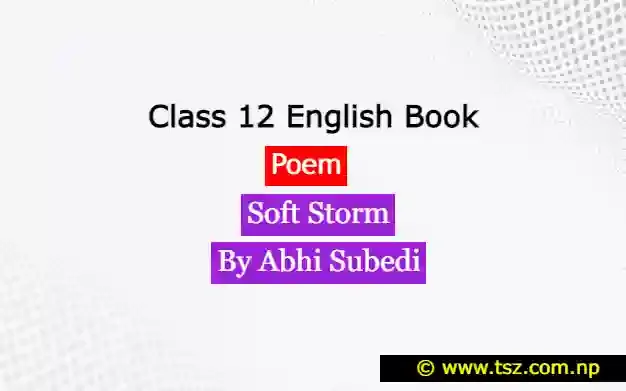Summary of Soft Storm by Abhi Subedi Class 12 English
Soft Storm Summary by Abhi Subedi class 12 English Book Poem is here.
Also Read:Soft Storm by Abhi Subedi Exercise
Main Summary
The main summary of the poem entitled “Soft Storm,” Subedi, is the feeling that is developed with a touch of compassion in the speaker, which contemplates over the absurdities of tumultuous times.
It's written in free verse by Abhi Subedi. It's a beautiful mix of natural and social descriptions, and it's written in rhyme. On the surface, it shows the speaker's journey through a narrow street and the lights of Kathmandu at night. In its deeper meaning, it shows people's indifference to the poor conditions and suffering of the people, male practices, a tumultuous atmosphere, and chaos in the Nepalese society.
Stanza 1: What does it mean?
Using words like "tumultuous" and "eerie," the poet first shows the chaos in Nepalese society. Then, he moves to a more hopeful situation by saying the sky "grew like crocuses," which refers to the blooming of Irish flowering plants over stones. These plants grow about five inches taller now. As soon as the moon is about to set, he talks about posters, politics, and many other things that happen in the world. It's an expression used to describe the way individuals talk to one another regarding social events. He softens again when he sees the softness of rose like a gale' from the roofs of his house. A rose is soft and a strong wind is strong, so he uses this simile to show how people in society do things that are bad. This is the next thing that he talks about. He compares the singing of the moon and the light with a city that is seamless, which is a city that some people find easy and comfortable.
The second stanza's meaning
During the second stanza, he talks about children who have no parents and are living in terrible poverty in Thamel. People who are corrupted in politics are only concerned about themselves and their families, not the poor people and orphans in their country. These future pillars are at risk and living in a bad way. One of the main reasons of this is the prevalence of social ills in the nation. On the other hand, when he comes back from a place where people were dancing with mad steps, having parties, and having ceremonies in skyscrapers and big hotels, he thinks about how free people were in the past.
Stanza 3: What does it mean?
There is a forlorn child who is crying and looking for his mother all over. He gets soft-hearted again when he thinks about the child with the transistor around his neck, who is looking for his mother all over. The child is scared. A man is brutally beaten in front of his own family for no apparent reason. It says that in the modern world, people don't pay attention to each other, and power is all over. These illegal activities make the speaker angry with the government.
The fourth stanza's meaning
In the fourth verse, the poet describes a man whose shirt is stained with blood and whose lips are wounded, who is unable to speak because the night's powerful occupants have silenced his voice. People who own land and people who work on it play hide and seek.
The fifth stanza's meaning
They haven't been heard and stormed, but Leela or the heavenly play hasn't been expected.
The sixth stanza's meaning
In the sixth stanza, the poet expresses a positive outlook for the town's residents by depicting the growth of Irish blooming plants over the stone, storms flowing into public areas, and the sun shining in a rainbow of colors. Aside from the chaotic situation caused by a country ruled by oppressive regimes, there are several more examples of chaos in the form of soft storm, silent pages, forlorn clothing, and religious celebrations.
The Seventh Stanza's Message
In the seventh stanza, he talks about some of the things that make his heart soft, like valuable things, selfish people, lawless people, messed up and ruined mother earth, and the painful lives of other poor animals.
Meaning of last stanza
It's the end of the poem, and the speaker says that he needs freedom for himself and for all the animals on this earth. He prefers a peaceful sky and the freedom to dance to the beautiful sounds of nature, such as a gentle storm and the sweet chirping of birds, in a circle that never ends.
Word Meanings of difficult words
Glossary
tumult (n.): violent and noisy commotion or disturbance of a crowd or mob; uproar
eerie (adj.): so mysterious, strange, or unexpected as to send a chill up the spine
crocuses (n.): a type of flowering plants in the iris family
seamless (adj.): moving from one thing to another easily and without any interruptions or problems
melee (n.): confusion, turmoil, jumble
protruded (adj.): stuck out from or through something
Leela (n.): a divine play
loitered (v.): moved slowly around or stand in a public place without an obvious reason
pensively (adv.): done in a thoughtful manner, often with sadness
spools (n.): a cylindrical device which has a rim or ridge at each end and an axial hole
for a pin or spindle and on which material (such as thread, wire, or tape) is wound
minuscule (adj.): very small
About the Soft storm Poet, Abhi Subedi
A prolific poet, playwright, and critic, Abhi Subedi (1945) has remained one of the eminent personalities in the field of literature in Nepal. Born in Sabla village of Terhathum district, Subedi has written several plays including Dreams of Peach Blossoms (2001) and Fire in the Monastery (2003). Subedi, who taught at the Central Department of English, Tribhuvan University, for around 40 years, has poetry collections like Manas (1974) and Chasing Dreams: Kathmandu Odyssey (1996) and Shabdara Chot (1997) to his credit.
